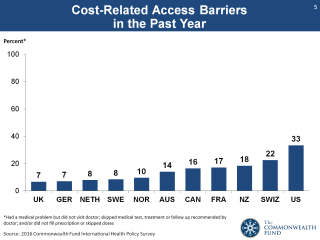Americans are still struggling with their health, and rank last against citizens of 10 other wealthy countries when it comes to emotional distress, struggling to pay for care and skipping doctor visits, a new report finds.
The latest report from the Commonwealth Fund, which routinely points to the shortcomings of the U.S. healthcare system, shows not much has changed in 15 years or longer. Americans still pay far more for medical care than people in other rich Western nations but have little to show for all that spending.
The group surveyed 26,863 adults from Australia, Britain, Canada, France, Germany, the Netherlands, New Zealand, Norway, Sweden, Switzerland, and the United States.
It found 43 percent of low-income Americans went without medical care because of costs. In the other countries, these rates ranged from 8 percent in Britain to 31 percent in Switzerland.
“In comparison to adults in the other 10 countries, adults in the United States are sicker and more economically disadvantaged,” the report reads.
Related: New Survey Finds Surprise Medical Bills in ER
“The United States trailed other countries in making health care affordable and ranked poorly on providing timely access to medical care (except specialist care),” the report reads. “Problems were often particularly acute for low-income adults.”
Yet Americans now spend $9,523 per person a year on medical expenses — by far the most among developed countries. Health spending now tops $3 trillion a year. Health insurance premiums have been steadily rising since 2008 and employers, who cover 60 percent of Americans, have been increasing the amount their workers must contribute to their own medical care.
Related: Health Spending Goes Up Again in U.S.
“The U.S. spends more on health care than any other country, but what we get for these significant resources falls short in terms of access to care, affordability, and coordination,” said Commonwealth Fund President Dr. David Blumenthal.
“We can learn from what is working in other nations. If we’re going to do better for our patients, we need to create a health care system that addresses the needs of everyone, especially our sickest patients, and those who struggle to make ends meet.”
The weaknesses predate the 2010 Affordable Care Act, widely known as Obamacare. It was President Barack Obama’s signature legislation, but was from the beginning a compromise, broadly rejected by Republicans in Congress and criticized by liberals who wanted a single-payer system.
The law was meant to gradually lower health care costs by first getting more Americans health insurance so they could get chronic health conditions taken care of. It’s gotten an estimated 20 million more covered, bringing the rate of people without health insurance down from 15 percent to under 9 percent now.
The report says it’s only begun, but president-elect Donald Trump has promised to either repeal or significantly reform it.
Related: Trump Health Plan Would Raise Costs, Report Finds
“The major coverage expansions of the law were launched only in 2014 and are thus still in a ramping-up period,” the report reads.
“In addition, there are ongoing barriers to coverage, including the fact that—as of November 2016—19 states have not chosen to expand eligibility for their Medicaid programs, the exclusion of undocumented immigrants from both Marketplace and Medicaid coverage, low awareness of coverage options, and concerns about affordability among those who remain uninsured,” it adds.
“An estimated 23 million adults in the United States lack health insurance, while the other countries in our survey have universal coverage.”

The report finds Americans are more likely than people in other countries to have more than one chronic condition such as arthritis, heart disease, asthma, high blood pressure or diabetes. It found 28 percent of Americans have multiple chronic conditions, compared to 14 percent in Britain and the Netherlands, 18 percent in France and 22 percent in Canada.
The Commonwealth Fund says its research consistently finds that providing high-quality, well-coordinated and inexpensive health coverage translates to better health overall.
“For example, the health care systems in Canada, the Netherlands, and the United Kingdom have no deductibles or cost sharing for primary care; the French system exempts low-income adults and those with chronic illnesses from cost sharing; and out of-pocket spending is capped at 1 percent of income for the chronically ill in Germany and at US $123 annually in Sweden,” it says.
Related: Health Insurance Premiums Have Been Growing Since 2008
The group’s Sara Collins said if Americans continue to get better access to health insurance, their health should start to improve.
“It’s really too early to know whether and how and which part of the law the new administration might address in the coming months,” she told reporters.
“The hallmark of these other countries in these surveys is that everyone has health insurance.”
The U.S. wasn’t last on everything. The Commonwealth team found U.S. adults have timely access to specialists, with just 6 percent waiting longer than two months for an appointment. “In Germany, France, the Netherlands, and Switzerland, rates were similar, ranging from 3 percent to 9 percent,” the group said.
And more Americans talk with doctors about diet and exercise — 59 percent had done so in the past two years, compared to just 17 percent in France and Germany and 41 percent in Canada.
[Source:-NBC]




